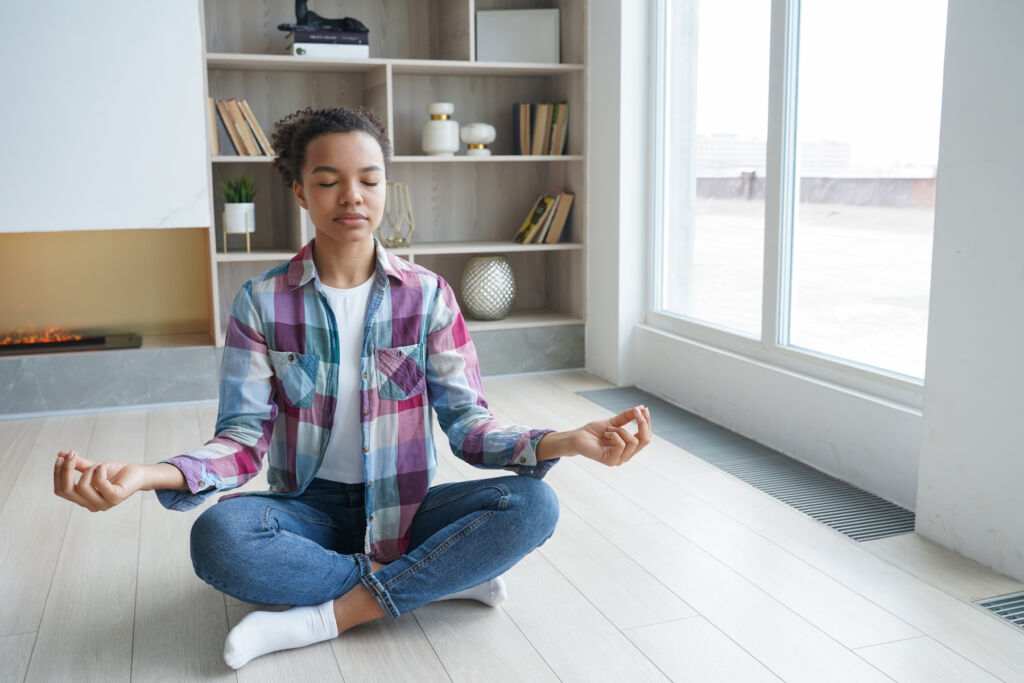
Stress is often described as the silent saboteur of inner peace, particularly in today’s fast-paced, digitally connected world. Understanding the intricate connection between stress and peace, especially how stress disrupts our mental, emotional, and physiological balance, is crucial for achieving long-term wellness.
The Physiological Toll of Stress on the Body
From a physiological standpoint, stress triggers the release of cortisol, commonly referred to as the “stress hormone,” which profoundly affects the body’s ability to maintain peace and balance.
Elevated cortisol levels can lead to increased heart rate, elevated blood pressure, and heightened alertness. This chronic state of “fight or flight” disrupts your ability to relax and, more importantly, impacts your sleep cycle. Poor sleep patterns, in turn, aggravate stress, creating a vicious cycle of mental and physical exhaustion.
Stress’s effect on sleep is particularly concerning because it prevents the body from entering the restorative stages of sleep, such as slow-wave sleep (deep sleep) and rapid eye movement (REM) sleep, where healing and memory consolidation occur. When this happens over time, individuals may experience symptoms of insomnia, difficulty staying asleep, or fragmented sleep—all of which diminish one’s sense of peace and well-being.
Sleep and Mental Health – A Reciprocal Relationship
There is a reciprocal relationship between sleep and mental health. One poor night’s sleep can impair your brain’s emotional regulation, particularly by affecting brain regions such as the amygdala, making you more prone to overreact or feel overwhelmed. This is especially noticeable in high-stress environments such as elite sports, where managing mental resilience is crucial. When stress levels rise, sleep quality often declines, and with poor sleep comes heightened emotional reactivity.
When we are sleep-deprived, our bodies struggle to cope with the stressors of daily life, and simple tasks can feel insurmountable. The challenge arises from the ongoing nature of this cycle—stress can contribute to poor sleep, which diminishes our ability to manage stress or negative emotions effectively. Over time, this may impact mental health, which can further affect sleep, creating a continuous loop.

Recognising the Signs of Stress Disrupting Peace
Common signs that stress is negatively impacting your inner peace include irritability, anxiety, and difficulty concentrating. Physically, it manifests as fatigue, headaches, and muscle tension. Many individuals also notice behavioural changes, such as turning to unhealthy coping mechanisms like increased screen time or late-night work, which only reinforce the problem by further delaying sleep and disrupting circadian rhythms.
Breaking the Cycle – Practical Solutions for Managing Stress and Enhancing Sleep
Fortunately, there are several practical strategies to break the stress-sleep cycle and restore peace. Implementing a consistent sleep routine is one of the most effective ways to manage stress. Structure is key to maintaining regular bed and wake-up times, to reinforce the body’s natural circadian rhythms and ensure you get the rest you need to manage stress effectively.
Other essential tips include creating pre-bedtime routines that signal to your body it’s time to wind down. This could be as simple as turning off stimulating devices like phones or work emails at least an hour before bed or engaging in relaxing activities like journaling outside the bedroom, which allows you to process your thoughts and feelings without bringing stress into your sleep space.

Diet and environmental factors are also important for good sleep. Avoid heavy meals, caffeine, and sugar close to bedtime. Similarly, keep your bedroom cool and dark, with a quiet atmosphere, to help your body recognise that it’s time to sleep. Additionally, engaging in daily physical activity and ensuring ample exposure to sunlight, especially in the morning, supports a balanced circadian rhythm and reduces stress levels throughout the day.
Holistic Approaches to Managing Stress for Better Sleep
Holistic wellness practices, such as mindfulness, meditation, and breathing exercises, are powerful tools for reducing stress and promoting better sleep. Mindfulness teaches you to be present and engaged with your thoughts without judgment. This simple practice encourages inner peace, even during times of high stress.
For individuals struggling to quiet their minds, techniques like focusing on the sensation of breath or visualising peaceful environments, such as a river with falling leaves, can also help redirect attention away from stressful thoughts.

Stress is inevitable, but its impact on your peace and well-being is not. By adopting mindful practices, creating healthy sleep habits, and using tools such as sleep-tracking devices and appropriate therapy as needed, you can mitigate stress and create a greater sense of peace in your life.
Peace begins with a rested mind and body, and by prioritising your sleep and stress management, you take the first step toward long-lasting wellness.
While these lifestyle modifications can improve sleep for many individuals, it’s also important to note that those with underlying sleep disorders may require clinical intervention beyond these tips. If sleep issues persist, consult a healthcare professional for further evaluation.
Top Tips for Sleep in Autumn
As we transition into autumn and the days become shorter, sleep can be affected by seasonal changes. Here are five top tips to enhance sleep during this season:

1. Use a daylight lamp or wake-up light: These devices simulate natural sunlight, helping regulate your body’s circadian rhythm as daylight hours shorten.
2. Maintain a consistent sleep routine: Stick to your usual sleep schedule, regardless of the changing weather.
3. Optimise your sleep environment: Take advantage of cooler temperatures by ensuring your room is comfortably cool, dark, and quiet for optimal rest.
4. Avoid screen time before bed: As the nights draw in, resist the temptation to stay up late scrolling on your phone or watching TV, as our body sees these as ‘waking’ actions and will ultimately confuse your natural sleep routine.

5. Incorporate relaxation techniques: Practice mindfulness, meditation, or breathing exercises before bed to calm your mind and prepare your body for sleep.
While these lifestyle modifications can improve sleep for many individuals, it’s important to note that those with underlying sleep disorders may require clinical intervention beyond these tips. If sleep issues persist, consult a healthcare professional for further evaluation.
This article was contributed by Joshua Piper, a Sleep Clinician at ResMed UK. www.resmed.co.uk.
![]()




You must be logged in to post a comment.